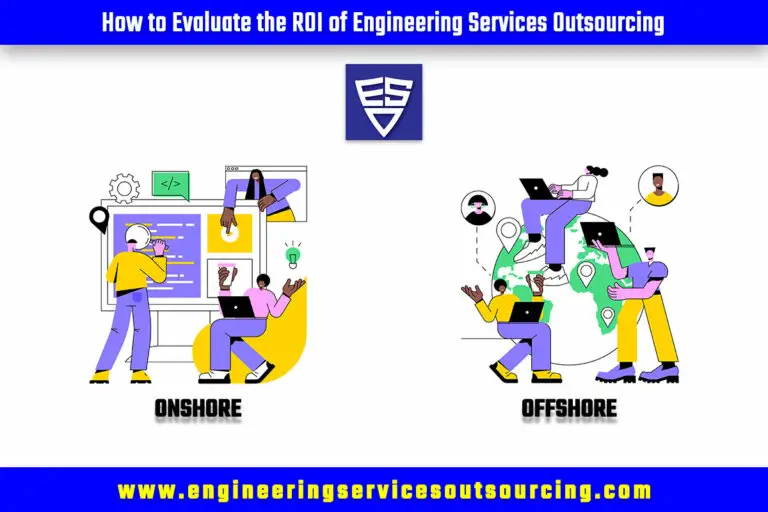In today’s digital age, data security has become a critical concern for businesses across various industries. When it comes to engineering services outsourcing, the protection of sensitive and confidential data is of utmost importance. Engineering companies often outsource various aspects of their projects, including design, analysis, testing, and documentation, to external service providers. While outsourcing offers numerous benefits such as cost savings, access to specialized skills, and accelerated project timelines, it also introduces potential risks to data security. In this article, we will explore the importance of data security in engineering services outsourcing and discuss strategies to safeguard valuable information.
Table of Contents
01) Protection of Intellectual Property
Engineering companies invest significant time, effort, and resources in developing intellectual property (IP) such as product designs, proprietary algorithms, and trade secrets. When outsourcing engineering services, there is a need to ensure that sensitive IP remains confidential and is not compromised. Robust data security measures, including access controls, encryption, and non-disclosure agreements (NDAs), should be in place to protect valuable intellectual property. By safeguarding IP, companies can maintain their competitive advantage and prevent unauthorized use or theft of their innovations.
02) Confidentiality of Client Information
Engineering services outsourcing often involves working with clients’ confidential information, such as project specifications, customer data, and proprietary processes. Maintaining the confidentiality of this information is crucial to preserve client trust and protect their business interests. Service providers must have robust data security protocols in place to prevent unauthorized access, data breaches, or leakage of sensitive client information. Stringent access controls, secure data storage, and regular security audits can help ensure the confidentiality of client data throughout the outsourcing engagement.
03) Compliance with Data Protection Regulations
Data protection regulations, such as the General Data Protection Regulation (GDPR) in the European Union, impose strict obligations on organizations to protect personal data. When outsourcing engineering services, companies need to ensure that their service providers comply with relevant data protection regulations. This includes obtaining explicit consent for data processing, implementing necessary security measures, and ensuring proper data handling practices. Compliance with data protection regulations not only mitigates legal risks but also demonstrates a commitment to ethical data management.
04) Mitigation of Cybersecurity Risks
Cybersecurity threats, including data breaches, malware attacks, and ransomware, pose significant risks to engineering services outsourcing projects. Service providers must have robust cybersecurity measures in place to detect, prevent, and respond to potential threats. This includes regular security assessments, vulnerability testing, and employee training on cybersecurity best practices. By addressing cybersecurity risks, organizations can minimize the chances of data breaches and protect their sensitive information from malicious actors.
05) Maintaining Business Continuity
Data security is closely tied to business continuity. In the event of a data breach or loss of critical information, organizations may experience operational disruptions, reputational damage, and financial losses. When outsourcing engineering services, it is essential to assess the service provider’s data backup and disaster recovery capabilities. This ensures that adequate measures are in place to protect data integrity and enable quick recovery in the event of an unforeseen incident. Regular data backups, off-site storage, and disaster recovery plans are crucial elements of maintaining business continuity.
06) Vendor Risk Management
Outsourcing engineering services involves partnering with external vendors and service providers. It is essential to conduct thorough vendor assessments to evaluate their data security practices and capabilities. This includes assessing their infrastructure, data handling processes, employee training, and compliance with industry standards. By implementing robust vendor risk management protocols, organizations can ensure that their data is entrusted to reliable and trustworthy partners.
07) Employee Awareness and Training
Data security is not solely the responsibility of service providers. Organizations outsourcing engineering services must also prioritize employee awareness and training. Employees should be educated about the importance of data security, their roles and responsibilitiesin safeguarding sensitive information, and best practices for data protection. Regular training sessions can help employees understand potential risks, such as phishing attacks, social engineering, and unauthorized access attempts. By fostering a data security awareness culture, organizations can empower their employees to be vigilant and proactive in protecting valuable data.
08) Secure Data Transmission and Storage
During engineering services outsourcing, data is often transmitted and shared between the client and the service provider. It is crucial to ensure that data transmission channels are secure and encrypted to prevent unauthorized interception or access. Additionally, data storage should adhere to industry best practices, including secure servers, firewalls, and encryption protocols. Implementing secure data transmission and storage measures strengthens the overall data security framework and reduces the risk of data compromise.
09) Regular Security Audits and Assessments
To maintain a robust data security posture, organizations should conduct regular security audits and assessments of their outsourcing partners. These audits can evaluate the effectiveness of data security controls, identify potential vulnerabilities, and recommend improvements. Regular assessments demonstrate a commitment to proactive risk management and provide an opportunity to address any gaps in the data security infrastructure.
10) Incident Response and Recovery Plan
Despite the best preventive measures, data breaches or security incidents may still occur. It is essential for organizations to have a well-defined incident response and recovery plan in place. This plan outlines the steps to be taken in the event of a security incident, including notifying relevant stakeholders, containing the breach, and initiating recovery procedures. Having a clear and tested plan ensures a swift and effective response to minimize the impact of a security incident.

Conclusion
In conclusion, data security plays a crucial role in engineering services outsourcing. By prioritizing the protection of intellectual property, maintaining client confidentiality, complying with data protection regulations, mitigating cybersecurity risks, ensuring business continuity, implementing vendor risk management practices, fostering employee awareness and training, securing data transmission and storage, conducting regular security audits, and establishing an incident response plan, organizations can mitigate risks and safeguard their valuable data. Investing in robust data security measures not only protects sensitive information but also enhances client trust, strengthens partnerships, and promotes long-term success in engineering services outsourcing engagements.
Related Article:






